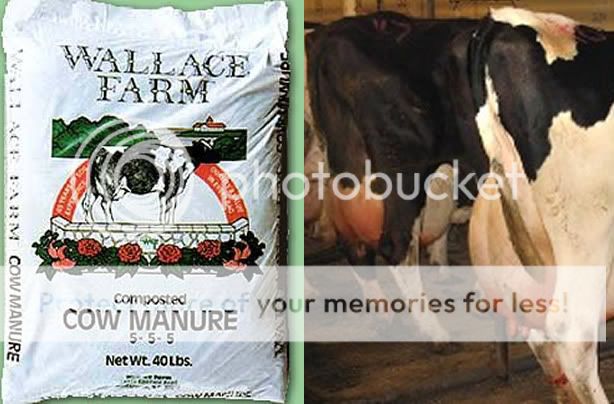Manures
Well-rotted animal manure is one of the finest by-products that are available to the organic gardener.
It may sound like a messy and an unhygienic substance to handle but in this form it looks completely different from the fresh product.
It doesn't smell, in fact it resembles rich, brown, crumbly compost, which of course it is.
However, when handling any type of composts and fertilizers it is sensible to wear gloves.
Farmyard manure is a mixture of the droppings of horses, pigs or cows, including their urine and the litter used for their bedding.
Cow manures are wetter, colder and lower in nutrients than horse manure, and decompose more slowly in the soil, which makes them more suitable for sandy soils.
Likewise, pig manure is slow acting but long lasting, as it is slow to ferment, this too is a cold manure and therefore unsuitable for the making of hot-beds.
Bullock manure is not recommended because many are fed a composition diet to build up tissue and body weight, therefore the residue could be transported into their manure and which might not necessarily be beneficial to us.
One ton of farmyard manure will give about 10lb. Nitrogen, 5lb. Phosphoric acid and 10lb. Potash, much of which is accessible to the plants soon after application.
Photo / picture / image of Composted Cow Manure.
_______________________________________________________________
Not everyone lives in the country or close by riding stables but many of the animal manures can be purchased from good Garden Centres or from suppliers with web sites who can deliver to your home.
Manures are generally good all round balanced fertilizers with amounts of nitrogen as well as a little of many other ingredients.
It must always be used when it has matured, fresh will harm the plants by "burning" the stems and roots. If you are able to collect it from source let it rot for about 8 weeks but do make sure that you cover it to stop the rain-washing away all the nutrients.
In autumn dig lots of manure into the vegetable plots it will ensure that the plants have a really good start in the following season.
Besides root crops prefer soil that has been manured the previous season.
Chicken Manure
Chicken manure is often sold in pellet form so it is easy and cleaner to handle.
It is very rich being high in nitrogen but it is lacking in almost all other nutrients. However it is very useful when used combined with other fertilizers.
Chicken manure must never be used fresh.
Hop Manures
Spent hops are useful for improving the physical condition of the soil, however they have little if any nutrients.
Compost
The term "compost" is generally thought to mean a mixture of soil, peat and sand, which is used in potting and often called potting compost.
There is another medium, which is vegetable waste of all kinds, which has been thoroughly rotted down and formed a blackish-brown crumbling material very near to humus.
I think everyone is aware of the benefits of composted plant waste.
Rich in all the necessary ingredients including micronutrients and micro organisms it is one of the best if not the best products we can use on our soil.
Whether it is a simple worm bin or specially built container, anyone who is keen to grow his or her own food must have a compost source.
Not only will it be a place to dispose of the grass cuttings but you can add lots of other waste too:
1. Leaves
2. Clippings
3. Straw.
4. Sawdust.
5. Shredded branches and twigs.
6. Cut flowers.
7. Comfrey leaves.
8. Tea leaves.
9. Coffee grounds.
10. Egg shells.
11. Banana skins.
12. Fluff from the vacuum cleaner.
13. Manure.
14. Urine.
15. Shredded paper.
16. Vegetable waste
If you live near the sea you can add kelp (a form of sea weed).
Never add kitchen scraps because it will attract vermin. Other ingredients that should not be used are dog or cat manure (their worming treatment will kill off the composting worms); don't use citrus peel either its too acidic for worms and don't use diseased plants it could mean that you run the risk of spreading the disease all around your garden.
To help the compost to rot down an activator should be used.
This can be manure, bird droppings, urine or a propriety activator; in dry weather it should be watered.
http://www.gardenplansireland.com/forum/about436.html

